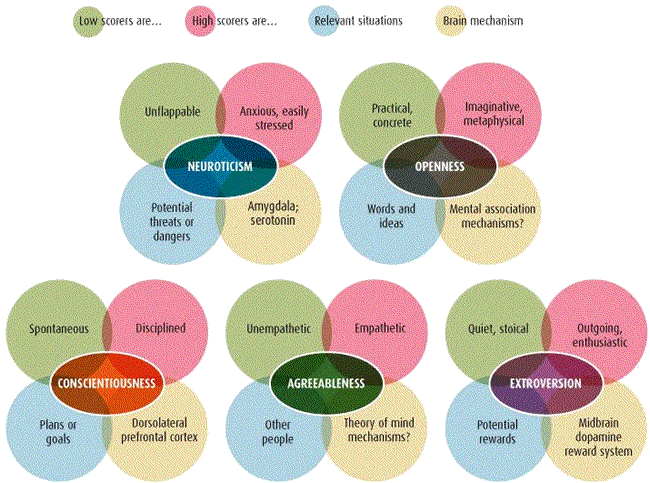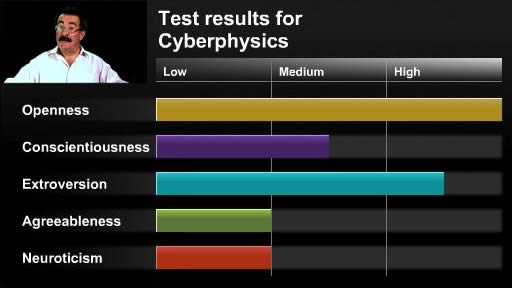|
|
|
Big Five Personality Traits

In contemporary psychology, the "Big Five" factors or Five Factor Model (FFM) of personality is a descriptive model used to classify human personalities by academics. This was developed about 15 years after the MBTI model - which is a commercial venture and therefore difficult to use in academic research (as you have to pay for the tests!). It has great similarities however. It employs comprehensive, empirical, data-driven research in the same way - but it names the traits differently - and there are five instead of four!
E and A relate almost directly to E/I and T/F - O and C have elements of N/S and J/P to them - but N is a new one - MBTI does not cover that - it just warns that you would have this tendency under stress when exhibiting 'shadow self' characteristics - MBTI considers this as an abnormal state rather than the norm and does not assess for your tendency to be stressed into it!
There are five broad domains or dimensions of personality within this model:
O
|
Openness - sometimes called Intellect |
Openness is a willingness to consider new or unusual ideas.Open people have a general appreciation for art, science, emotion and adventure.
They display traits such as a strong imagination, curiosity. The characteristic distinguishes imaginative people from down-to-earth, conventional people. People who are open to experiences are intellectually curious, appreciative of art, and sensitive to beauty. They tend to be, compared to closed people, more creative and more aware of their own feelings. They are more likely to hold unconventional beliefs.
People with low scores on openness tend to have more conventional, traditional interests. They prefer the plain, straightforward, and obvious over the complex, ambiguous, and subtle. They may regard the arts and sciences with suspicion or even view these endeavors as uninteresting. |
C
|
Conscientiousness - (efficient / organized vs. easy-going / careless) |
Conscientiousness is a tendency to show self-discipline, act dutifully, and aim for achievement. The trait shows a preference for planned rather than spontaneous behaviour. It influences the way in which we control, regulate, and direct our impulses. Conscientiousness includes the factor known as Need for Achievement (NAch). |
E
|
Extraversion (or Exroversion) - (outgoing / energetic vs. shy / reserved). |
Extraversion is characterized by positive emotions, surgency, and the tendency to seek out stimulation and the company of others. The trait is marked by pronounced engagement with the external world. Extraverts enjoy the stimulation of other people's ideas and opinions. They often like being with people, and are frequently perceived as full of energy. They tend to be enthusiastic, action-oriented individuals who are likely to say "Yes!" or "Let's go!" to opportunities for excitement. In groups they feel the need to express themselves - to talk, assert themselves, and draw attention to themselves.
Introverts do not have the driving need for external stimulus. They therefore lack the social exuberance and activity levels of extraverts. They tend to seem quiet, low-key, deliberate, and less involved in the social world. Their lack of social involvement should not be interpreted as shyness or depression. Introverts simply need less stimulation than extraverts and more time alone. They may be very active and energetic in many ways, but just not socially. |
A
|
Agreeableness - (friendly / compassionate vs. competitive / outspoken). |
Agreeableness is a tendency to be compassionate and cooperative rather than suspicious and antagonistic towards others. The trait reflects concern for social harmony. It is a measurement of the extent to which we put other people’s
interests above our own. Some agreeable individuals value getting along with others so much that they are willing to cover up their true feelings in order not to offend someone else (that can be problematic). Agreeable people usually have an optimistic view of human nature - believing people are basically honest, decent, and trustworthy.They are generally viewed as considerate, friendly, generous, helpful, because they are willing to compromise their interests with others.They also are generally empathetic - able to understand how someone else is feeling, and this motivates them to make the other person feel 'better'.
Outspoken, tactless individuals place the need to be honest about how they feel above compromising their views just in order to get along with other people. They are generally more concerned with 'being true to themselves' rather than making others feel comfortable. They are therefore unlikely to tell white lies in social situations to make things go smoothly. In fact they can often be blunt and tactless. They are not concerned with 'getting on with others' and making other people feel happy in whatever situation they find themselves in. This does not mean that they care less than the agreeable person - just that they feel being honest about their opinions is the best course of action. This can lead to friction in families and in the workplace, but such people feel that it is better to have problems out in the open rather than covered just up to smooth the path through life. They are less likely to extend themselves for other people as 'being liked and appreciated' is not important to them and so they can appear very selfish. If they do put themselves out for someone it is most likely that they will do so anonimously. Sometimes skepticism about others’ motives causes them to be suspicious, unfriendly, and uncooperative. |
N
|
Neuroticism - sometimes referred to as emotional instability - (sensitive / nervous vs. secure / confident). |
Neuroticism is the tendency to experience negative emotions, such as anger, anxiety, or depression. It is sometimes called emotional instability. Those who score high in neuroticism are emotionally reactive and vulnerable to stress. They are more likely to interpret ordinary situations as threatening, and minor frustrations as hopelessly difficult.
Their negative emotional reactions tend to persist for unusually long periods of time, which means they are often in a bad mood. These problems in emotional regulation can diminish the ability of a person scoring high on neuroticism to think clearly, make decisions, and cope effectively with stress.
At the other end of the scale, individuals who score low in neuroticism are less easily upset and are less emotionally reactive. They tend to be calm, emotionally stable, and free from persistent negative feelings. Freedom from negative feelings does not mean that low scorers experience a lot of positive feelings - it just means they don't get those extreme lows! |
Which of these personality traits apply to you?
Open |
Closed |
- I have a rich vocabulary.
- I have a vivid imagination.
- I have excellent ideas.
- I spend time reflecting on different interpretations of things.
- I use words that some people think are difficult or complicated. |
- I like plain straightforward speaking
- I look for the simple truth.
- I am not interested in abstractions I value concrete facts.
- I see things as they really are.
- I have difficulty understanding the point of abstract ideas. |
Conscientious |
Easy Going |
- I like to be always prepared.
- 'Those who don't plan, plan to fail!' - I need to follow a schedule.
- I prefer to get chores done right away.
- I like order in all areas of my life. - I pay attention to details.
- I would feel very guilty if I did not do what I ought to. |
- Some people think I am disorganised because I do things 'off the cuff'..
- I get easily distracted and often leave things to the last minute - I can be messy!
- I often don't bother to put things back in their proper place.
- I sometimes shirk my duties. |
Extrovert |
Introvert |
- People think of me as 'loud' or 'chatty'.
- I like to meet new people
- I don't mind being the center of attention.
- I need to interact with people and respond to their views. - I start conversations.
- I talk to a lot of different people at parties.
- I need to express my opinion |
- People think of me as shy or ask me what is wrong when I am not depressed - just quiet!
- I am always quiet around strangers. - I don't like to draw attention to myself.
- I don't talk a lot.
- I have little to say in a discussion . I'd rather listen to everyone else's views. |
Agreeable |
Tactless |
- I like people to like me.
- I easily understand others' feelings.
- I have a soft heart.
- I make people feel at ease.
- I sympathize with others' feelings and try hard not to hurt their feelings.
- I put myself out for others. |
- I value being honest with others, even if it hurts them.
- Other people's problems are their own concern - they should deal with them, not moan to me!
- I am easily irritated by other people's inane chatter.
- Some people think that I intend to insult people.
- I prefer being isolated rather than 'going along with the crowd'. |
Neurotic |
Stable |
- I get irritated easily.
- I get stressed out easily.
- I get upset easily.
- I have frequent mood swings.
- I often feel blue.
- I worry about things. |
- Bad things happen! You just have to deal!
- 'Cowards die many times before their death - the valiant only taste of death but once'
- worrying doesn't help at all!
- I'll cope whatever happens at the time - why worry?
- I am seldom moody.
- I seldom feel blue.
- I generally look for the silver lining
- tomorrow is another day! |
This featured on the BBC in 2014. If you were over 18 you could test yourself on the BBC Big Personality Test - it used this form to express your results... mine are below!

|

Follow me...




|







